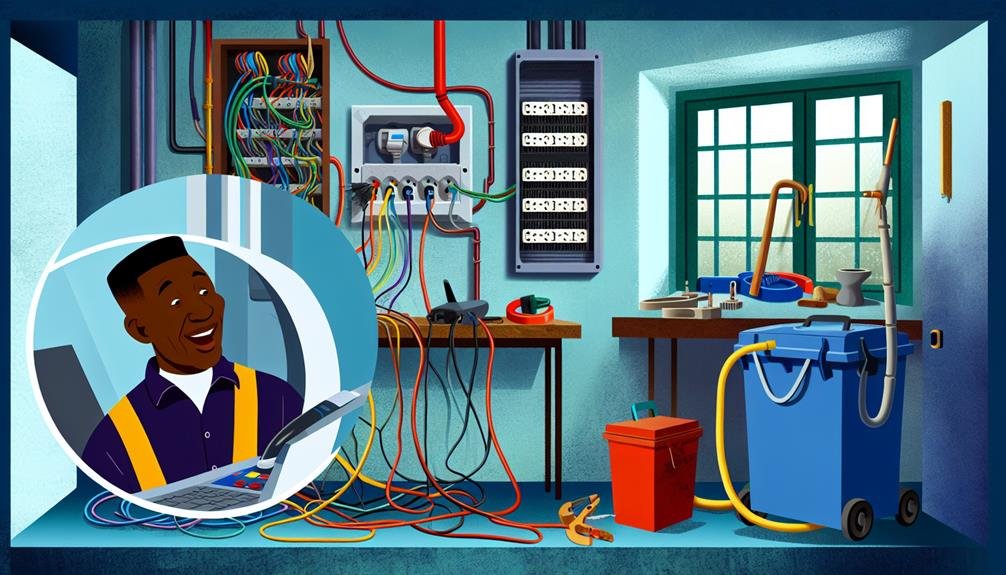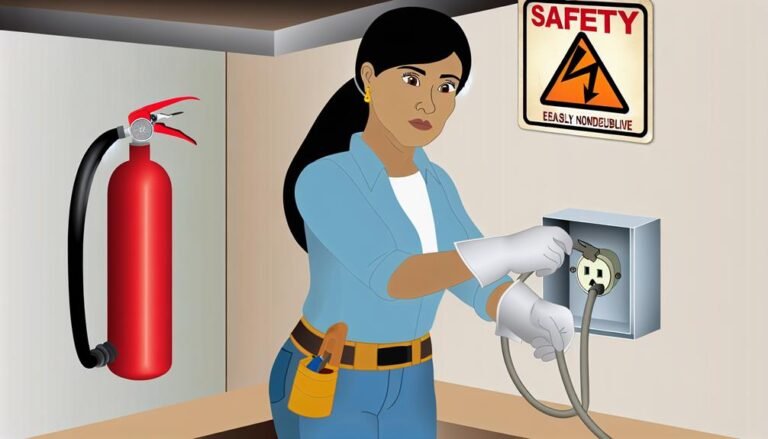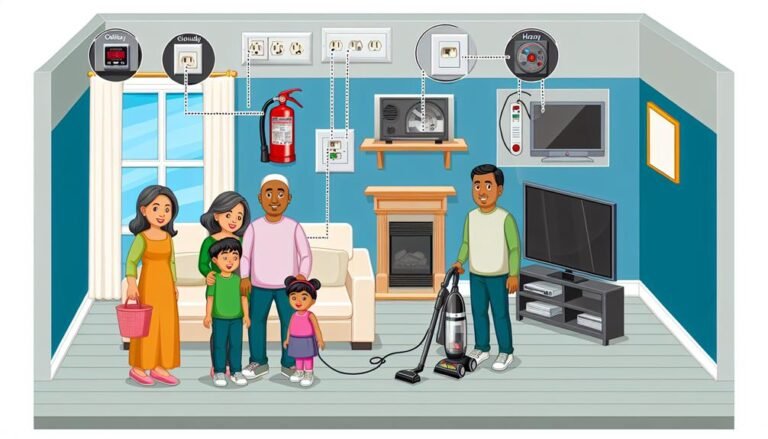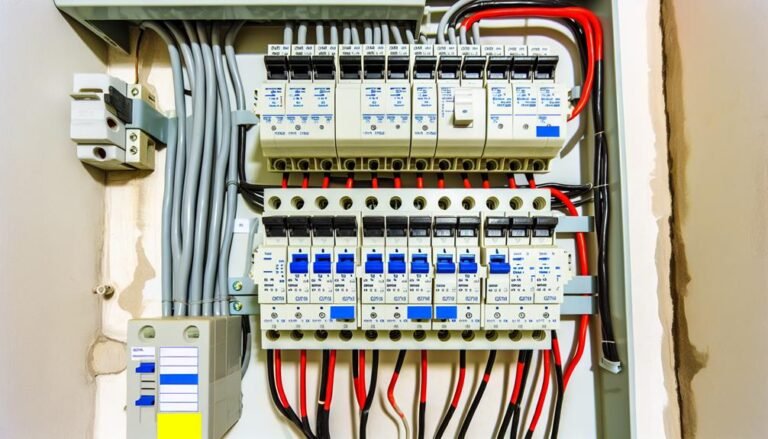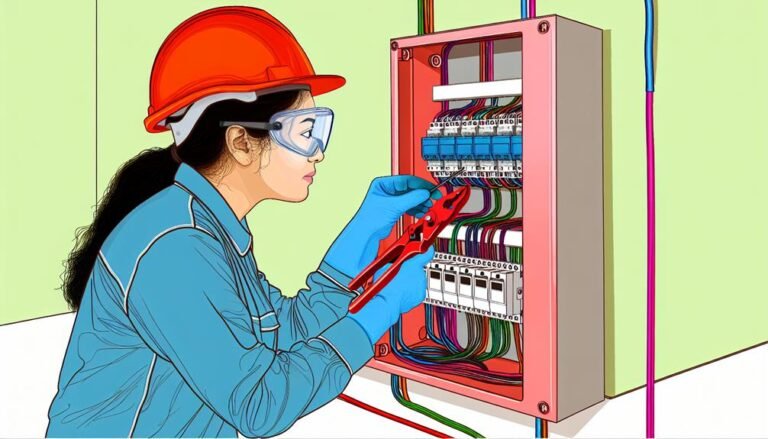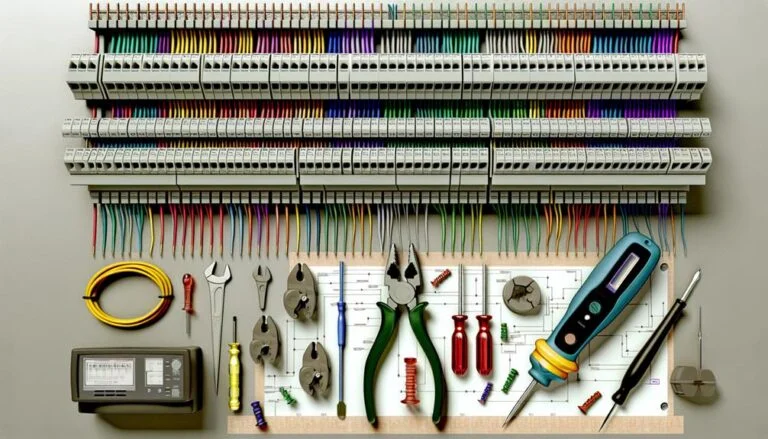They say that knowledge is power, and when it comes to your safety, that couldn't be more true. You may not realize it, but your home may be harboring potential electrical hazards that could put you and your loved ones at risk.
From faulty wiring to overloaded circuits, outdated electrical panels to damaged appliances, and improper grounding, there are several common hazards that can lurk in residential areas.
But fear not, because in this discussion, we will shed light on these dangers and provide you with the information you need to keep yourself and your home safe.
So, let's dive in and uncover the hidden electrical hazards that may be hiding in plain sight.
Key Takeaways
- Regular inspections by professional electricians can help identify and repair faulty wiring, reducing the risk of electrical fires and electrocution.
- Distributing electrical loads evenly across multiple circuits and using power strips with built-in overload protection can prevent overloaded circuits from causing fires.
- Upgrading to a modern and capable electrical panel that can handle the electrical load required by modern appliances and devices is essential for safety.
- Regularly checking appliances for signs of damage, such as frayed cords or loose connections, can prevent electrical fires and shocks. Proper grounding of electrical equipment and always using grounded outlets also reduce the risk of electrical hazards.
Faulty Wiring
Faulty wiring poses a significant electrical hazard in residential areas due to the potential for electrical fires and electrocution. It's crucial to ensure that the electrical wiring in your home is in good condition to prevent these dangerous situations.
Fire hazards can arise from faulty wiring when there's an excessive flow of electricity, causing the wires to overheat and potentially ignite nearby flammable materials. The presence of frayed or exposed wires increases the risk of electrical sparks, which can easily ignite a fire.
Additionally, faulty wiring can lead to electrical shocks. When the insulation around the wires wears off or becomes damaged, it exposes the live wires, making it possible for someone to accidentally come into direct contact with them. This can result in severe electrical shocks, causing injury or even death.
To mitigate these risks, it's essential to have a professional electrician inspect your home's wiring regularly. They can identify any faulty wiring and make the necessary repairs or replacements to ensure the safety of your household. Remember, proactive maintenance is key to preventing fire hazards and electrical shocks caused by faulty wiring.
Stay safe and secure by prioritizing the maintenance of your home's electrical system.
Overloaded Circuits
To ensure the safety of your home's electrical system, it's crucial to be aware of the potential hazards of overloaded circuits. An overloaded circuit occurs when too much electrical current is flowing through a circuit, exceeding its capacity. This can lead to several dangers that can put your home at risk.
Here are four important things to know about overloaded circuits and how to prevent them:
- Fire hazards: When a circuit is overloaded, it generates excessive heat. This heat can ignite flammable materials near the circuit, causing a fire. It's important to regularly check for signs of overheating, such as warm outlets or discolored wiring.
- Electrical safety precautions: To avoid overloading circuits, make sure to distribute electrical loads evenly across multiple circuits. Use power strips with built-in overload protection and avoid using too many high-wattage appliances on the same circuit.
- Circuit breaker tripping: When a circuit is overloaded, the circuit breaker will trip, cutting off the power supply. While this may prevent a fire, it can also be a sign of a larger electrical issue. If your circuit breaker frequently trips, it's important to have an electrician inspect your electrical system.
- Upgrading electrical system: If you frequently experience overloaded circuits, it may be necessary to upgrade your electrical system. Adding additional circuits or increasing the capacity of existing circuits can help prevent overloads and ensure the safe operation of your home's electrical system.
Outdated Electrical Panels
Outdated electrical panels pose significant safety risks and should be promptly replaced to ensure the proper functioning of your home's electrical system. These panels, also known as fuse boxes or breaker boxes, are responsible for distributing electricity throughout your home. Over time, advancements in technology and increased electrical demands have rendered many older panels inadequate and potentially dangerous.
One of the main reasons why outdated electrical panels are hazardous is their inability to handle the electrical load required by modern appliances and devices. This can lead to overheating, circuit breakers tripping frequently, and even electrical fires. To mitigate these risks, it's crucial to upgrade your electrical panel to a more modern and capable one.
When considering upgrade options, it's important to consult with a licensed electrician to determine the most suitable panel for your home's electrical needs. They can assess your current system, identify any potential safety hazards, and recommend the appropriate panel upgrade. Additionally, they'll ensure that the installation is done correctly and in compliance with safety regulations.
While waiting for the upgrade, there are some safety precautions you can take. Regularly inspect your panel for signs of damage, such as corrosion or melted wires. If you notice any issues, contact a professional immediately. Avoid overloading circuits by distributing electrical loads evenly and refrain from using multiple high-wattage appliances simultaneously. Finally, keep the area around your electrical panel clear and easily accessible for maintenance purposes.
Damaged Electrical Appliances
When it comes to maintaining the safety of your electrical system, it's crucial to address the issue of damaged electrical appliances. These appliances, if not properly maintained or repaired, can pose serious hazards to you and your home. To ensure the safety of your electrical system, be aware of the following:
- Electrical fires: Damaged electrical appliances can lead to electrical fires. Faulty wiring or internal components can cause overheating, which can ignite surrounding materials. Regularly check your appliances for any signs of damage, such as frayed cords, loose connections, or unusual smells.
- Electrical shocks: Faulty or damaged appliances increase the risk of electrical shocks. This can occur when you come into contact with exposed wires or faulty parts. Always unplug appliances before attempting any repairs or maintenance, and never touch them with wet hands.
- Trip hazards: Damaged appliances with loose or frayed cords can create trip hazards. Make sure to keep your appliances in good condition, with cords neatly organized and free from damage.
- Energy inefficiency: Damaged appliances may consume more energy than necessary, leading to higher electricity bills. Regularly inspect your appliances for any signs of wear and tear, and consider repairing or replacing them to ensure energy efficiency.
Improper Grounding
Improper grounding can result in serious electrical hazards and should be addressed promptly to ensure the safety of your residential electrical system. Grounding issues in older homes are common and can pose a significant risk to you and your family. To help you understand the importance of proper grounding and how to ensure safety in your residential area, let's discuss some safety measures for grounding.
| Grounding Hazards | Safety Measures | Benefits |
|---|---|---|
| Faulty or missing ground connections | Ensure that all electrical outlets are properly grounded. This may involve installing grounding wires or using grounded outlets. | Prevents electric shock and reduces the risk of electrical fires. |
| Grounding wire damage | Regularly inspect and maintain the grounding wires in your home. Replace any damaged or frayed wires immediately. | Maintains the integrity of the grounding system and ensures proper grounding of electrical equipment. |
|Improper grounding of appliances|Always connect appliances to grounded outlets. Avoid using adapters or extension cords that eliminate the grounding prong.|Prevents electrical malfunctions and reduces the risk of electrical shock.

